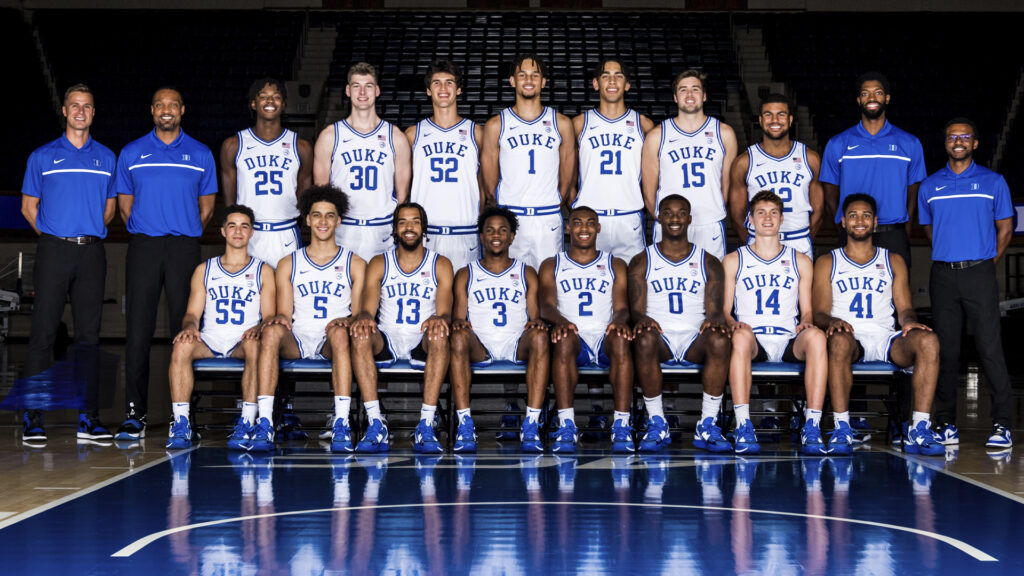Team History
The Duke Blue Devils men’s basketball team is one of the most storied programs in NCAA history. Their tradition dates back to 1906, with the team quickly becoming a force within the Southern Conference. Duke’s dominance truly took flight after joining the Atlantic Coast Conference (ACC) in 1953. Through the years, the program has amassed a staggering number of conference titles and tournament championships.
The Blue Devils are most closely associated with legendary coach Mike Krzyzewski (“Coach K”), who led the team from 1980 to 2021. Under his guidance, Duke won five National Championships, appeared in 13 Final Fours, and captured 15 ACC Tournament titles. Coach K’s era produced iconic players such as Christian Laettner, Grant Hill, JJ Redick, and Zion Williamson, cementing Duke’s reputation as a perennial powerhouse with a tradition of producing NBA stars.
Foundation and Early Years
Duke University, then known as Trinity College, fielded its first basketball team in 1906. While initial years were marked by inconsistency, the team started to find its footing in the 1920s. They joined the Southern Conference, where they enjoyed moderate success, even claiming a share of the conference title in 1929. During these early decades, the program established a foundation and laid the groundwork for its eventual rise to national prominence.
The team adopted the “Blue Devils” nickname in 1923. The name’s origin is inspired by the “Les Diables Bleus” (The Blue Devils), a French Alpine fighting unit known for their tenacity during World War I. This nickname change marked a turning point, symbolizing the program’s aspirations and establishing its enduring identity.
Notable Early Achievements
Even before their later dominance, the Blue Devils started to make their mark on college basketball. In the 1930s and 1940s, led by head coach Eddie Cameron, Duke established itself as a consistent power within the Southern Conference. They reached the Southern Conference Tournament championship game on multiple occasions, demonstrating their growing competitiveness.
While a national championship still eluded them, the Blue Devils laid the groundwork for their future success during this era. In 1946, Duke star Dick Groat became an All-American, showcasing the program’s ability to produce top-tier talent. Additionally, reaching the championship rounds of their conference tournament solidified their status as a contender and hinted at the greatness yet to come.
Periods of Change
Duke’s basketball program, like any long-standing institution, has experienced significant transitions throughout its history. One notable shift came in 1953 when Duke joined the newly formed Atlantic Coast Conference (ACC). This move thrust them into a more competitive environment and led to decades of intense rivalries with powerhouses like North Carolina and Wake Forest.
Another seismic change occurred in 1980 with the arrival of Mike Krzyzewski as head coach. Coach K inherited a program that had struggled in recent years. His transformational leadership propelled Duke to unimaginable heights. His tenure spanned over four decades and established Duke as one of the elite programs in college basketball. The retirement of Coach K in 2021 and the transition to new head coach, Jon Scheyer, marked another pivotal period of change as Duke begins a new chapter in its storied history.
Championships and Achievements
The Duke Blue Devils have amassed one of the most impressive resumes in college basketball history. They boast five NCAA National Championships (1991, 1992, 2001, 2010, 2015), showcasing their ability to perform at the highest level of the sport. Their dominance in the ACC is remarkable, with 21 ACC Tournament Championships and 19 regular-season titles, solidifying their position as a regular contender within the conference.
Beyond team successes, Duke has consistently produced NBA talent. Numerous Blue Devils have become household names in professional basketball, including Grant Hill, Kyrie Irving, Jayson Tatum, and Zion Williamson. This underscores Duke’s ability to not only win but also develop players for the next level.
Current Roster
The 2023-24 Duke Blue Devils men’s basketball team features a diverse and talented roster. Key players include freshmen Jared McCain, a guard from Sacramento, CA, and Sean Stewart, a forward from Windermere, FL, both bringing impressive high school credentials to the team. Veterans like senior guard Jeremy Roach and graduate student center Ryan Young add experience and leadership. The team also welcomes highly-rated recruits like Cooper Flagg, a forward from Newport, ME, showcasing the team’s blend of youth and experience for this season.
Management and Coaching Staff
The Duke Blue Devils men’s basketball team’s management and coaching staff are led by a group of experienced individuals dedicated to maintaining the program’s high standards. At the helm as the head coach is Jon Scheyer, who succeeded Mike Krzyzewski. Scheyer, a former Duke player and assistant coach, brings a deep understanding of the program’s culture and a commitment to excellence on and off the court. The coaching staff is rounded out by seasoned assistants and support staff, each bringing their expertise to develop players’ skills, strategy, and teamwork.
Home Stadium Information
The Duke Blue Devils men’s basketball team plays its home games at Cameron Indoor Stadium, located on Duke University’s campus in Durham, North Carolina. This iconic venue, known for its intense atmosphere and passionate fan base, often referred to as the “Cameron Crazies,” has been the home of Duke basketball since it opened in 1940. With a seating capacity of approximately 9,314, it’s renowned for being one of the most challenging places for visiting teams to play in college basketball.
-
*********** ***** ******* *** ***** ** ************ **** ********* *****dd.mm.yyyy 00:00 PM
-
****** *********** **** ** ***** ****** *** **** *** ******: ********* *** ******* *** ****'* ****dd.mm.yyyy 00:00 PM
-
*********-***** ********: **** 6 **** *** ***** *** * ********* **** 7dd.mm.yyyy 00:00 PM
-
**********-************ *******: ****** ****ć, ******* *******, *** * ********* ********** ********dd.mm.yyyy 00:00 PM
-
********* **** ********* ** *** ***: ********* *** ********* ** ****** ******** **. *** *** *****dd.mm.yyyy 00:00 PM
-
****************** ******* **********: *** ********' **** ****dd.mm.yyyy 00:00 PM







